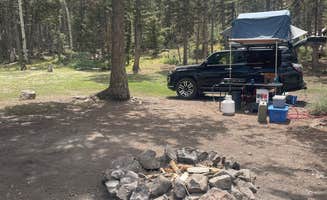Tent camping near Marysvale, Utah offers access to both developed and dispersed sites throughout Fishlake National Forest at elevations ranging from 6,500 to over 10,000 feet. The region receives approximately 15-20 inches of precipitation annually, creating a relatively arid mountain landscape dominated by aspen, pine, and juniper forests. Summer temperatures typically range from 45°F at night to 80°F during day, with rapid cooling after sunset due to the high elevation.
What to do
Fishing opportunities: City Creek Campground provides direct access to seasonal stream fishing, with the campground situated along a small mountain creek that supports native trout species. The creek flows strongest in early summer during snowmelt season when fishing is most productive.
Hiking trails: Mudsprings Trail Backcountry Camping serves as a gateway to extensive backcountry hiking routes through the Tushar Mountains. The area requires hikers to pack all supplies in and out with no facilities available. This secluded location offers genuine wilderness camping experiences for those willing to hike with full camping gear.
Wildlife viewing: Birch Creek Campground offers opportunities to observe local wildlife in their natural habitat. One camper noted: "My retriever who is used to bears refused to go out in the dark, probably Mt Lions about so watch small pets closely." The area supports diverse mountain wildlife including deer, elk, and smaller mammals.
What campers like
Privacy and seclusion: Fish Lake National Forest dispersed camping areas provide excellent isolation despite proximity to Interstate 70. As one camper described: "I passed several occupied sites but found a gorgeous pull through with beautiful views. Minor I70 noise, had cell service- T-Mobile. Private, only had 3 cars drive by in 18 hours."
Natural water features: Campers consistently praise the streams and creeks near established campgrounds. At Birch Creek Campground, visitors appreciate the natural setting alongside flowing water, with one noting: "Creek is lovely. Sites vary in their condition but flat tent or van spots are uncommon."
Accessibility with wilderness feel: Many tent campsites balance accessibility with natural surroundings. A camper at Fish Lake National Forest mentioned: "This was our first time boondocking and this spot did not disappoint! It's convenient to I-70 but feels very remote. We passed one other camper on the way in."
What you should know
Road conditions: Access roads to many Marysvale area campgrounds are unpaved and can be challenging. At Birch Creek Campground, a camper reported: "The 4.5 mile road off the highway is very good though dusty." Most access roads remain passable for passenger vehicles during dry weather but become problematic after rain.
Site availability: Most tent camping areas operate on first-come, first-served basis without reservations. Weekends from June through August see highest occupancy rates, particularly at established campgrounds with facilities. Dispersed camping areas typically have space available even during peak periods.
Cell coverage: Connectivity varies significantly by location and carrier. In Fish Lake National Forest camping areas, some visitors report: "Great views, quiet, only downside is no cell service," while others note adequate coverage with specific carriers: "I passed several occupied sites but found a gorgeous pull through with beautiful views. Minor I70 noise, had cell service- T-Mobile."
Tips for camping with families
Animal encounters: Families should establish clear wildlife safety protocols when tent camping near Marysvale. At Birch Creek Campground, visitors have reported potential mountain lion presence: "My retriever who is used to bears refused to go out in the dark, probably Mt Lions about so watch small pets closely." Keep food secured and children within sight at all times.
Water considerations: Most tent camping locations near Marysvale lack reliable drinking water. City Creek Campground is one of few sites offering drinking water access, though availability may be seasonal. Plan to bring 1-2 gallons per person per day for drinking and basic hygiene.
Weather preparation: Pack clothing layers for significant temperature fluctuations. Daytime temperatures can drop 30-40 degrees after sunset at higher elevations, and summer thunderstorms develop quickly. Even during July and August, nighttime temperatures regularly fall into the 40s.
Tips from RVers
Boondocking options: Fish Lake National Forest offers numerous dispersed camping options suitable for tent campers and small RVs. A visitor noted: "It's convenient to I-70 but feels very remote. We passed one other camper on the way in. There was a spot on the left that would have had awesome sunset views, but we took the next one on the right. It had a pull through and trees and was a bit more private."
Livestock encounters: Be prepared for domestic animals in dispersed camping areas. According to one camper at Fish Lake National Forest: "Cows meander around the campsite..didn't bother us. If you go past where the directions take you, there are 3 or 4 spots that are also nice. Road is easy to travel."
Overnight options: Many tent sites serve well for single-night stays. In Fish Lake National Forest, a camper shared: "Just needed to find a place for the night and this was perfect! No one around, huge site, beautiful views and free!"


